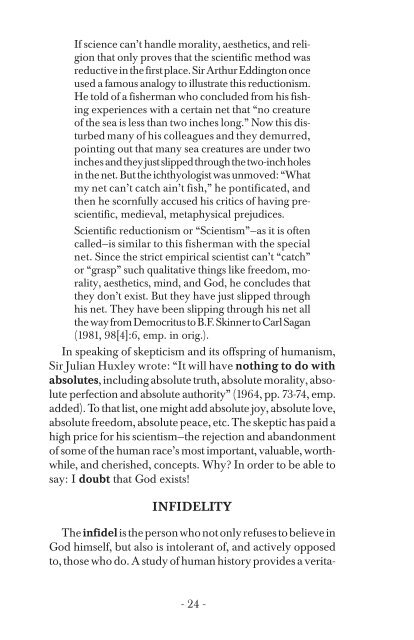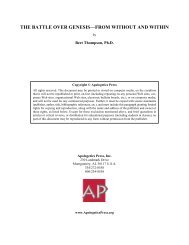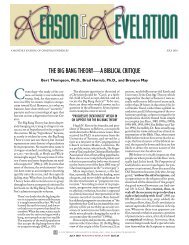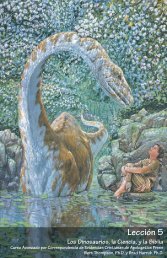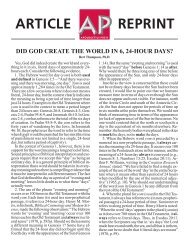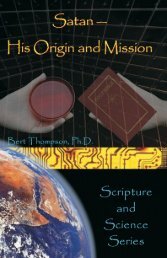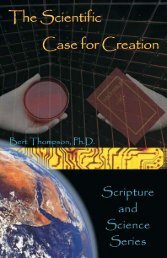The Many Faces, and Causes, of Unbelief - Apologetics Press
The Many Faces, and Causes, of Unbelief - Apologetics Press
The Many Faces, and Causes, of Unbelief - Apologetics Press
You also want an ePaper? Increase the reach of your titles
YUMPU automatically turns print PDFs into web optimized ePapers that Google loves.
If science can’t h<strong>and</strong>le morality, aesthetics, <strong>and</strong> religion<br />
that only proves that the scientific method was<br />
reductive in the first place. Sir Arthur Eddington once<br />
used a famous analogy to illustrate this reductionism.<br />
He told <strong>of</strong> a fisherman who concluded from his fishing<br />
experiences with a certain net that “no creature<br />
<strong>of</strong> the sea is less than two inches long.” Now this disturbed<br />
many <strong>of</strong> his colleagues <strong>and</strong> they demurred,<br />
pointing out that many sea creatures are under two<br />
inches <strong>and</strong> they just slipped through the two-inch holes<br />
in the net. But the ichthyologist was unmoved: “What<br />
my net can’t catch ain’t fish,” he pontificated, <strong>and</strong><br />
then he scornfully accused his critics <strong>of</strong> having prescientific,<br />
medieval, metaphysical prejudices.<br />
Scientific reductionism or “Scientism”—as it is <strong>of</strong>ten<br />
called—is similar to this fisherman with the special<br />
net. Since the strict empirical scientist can’t “catch”<br />
or “grasp” such qualitative things like freedom, morality,<br />
aesthetics, mind, <strong>and</strong> God, he concludes that<br />
they don’t exist. But they have just slipped through<br />
his net. <strong>The</strong>y have been slipping through his net all<br />
the way from Democritus to B.F. Skinner to Carl Sagan<br />
(1981, 98[4]:6, emp. in orig.).<br />
In speaking <strong>of</strong> skepticism <strong>and</strong> its <strong>of</strong>fspring <strong>of</strong> humanism,<br />
Sir Julian Huxley wrote: “It will have nothing to do with<br />
absolutes, including absolute truth, absolute morality, absolute<br />
perfection <strong>and</strong> absolute authority” (1964, pp. 73-74, emp.<br />
added). To that list, one might add absolute joy, absolute love,<br />
absolute freedom, absolute peace, etc. <strong>The</strong> skeptic has paid a<br />
high price for his scientism—the rejection <strong>and</strong> ab<strong>and</strong>onment<br />
<strong>of</strong> some <strong>of</strong> the human race’s most important, valuable, worthwhile,<br />
<strong>and</strong> cherished, concepts. Why? In order to be able to<br />
say: I doubt that God exists!<br />
INFIDELITY<br />
<strong>The</strong> infidel is the person who not only refuses to believe in<br />
God himself, but also is intolerant <strong>of</strong>, <strong>and</strong> actively opposed<br />
to, those who do. A study <strong>of</strong> human history provides a verita-<br />
-24


